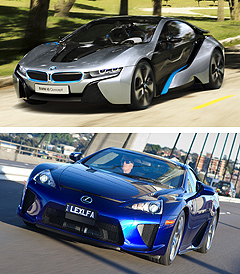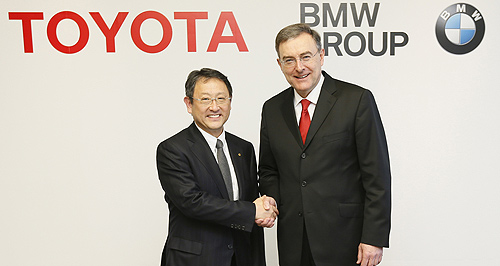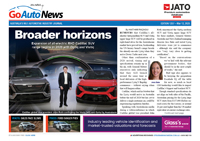News - ToyotaToyota and BMW get to work on fuel-cell sportscarIt’s a deal: Toyota president Akio Toyoda and BMW chairman Norbert Reithofer shake on their “binding agreement” for greater collaboration. Advanced sportscar and next-gen batteries on agenda for partners BMW and Toyota25 Jan 2013 A NEW mid-sized sportscar to be developed jointly by automotive leaders Toyota and BMW is likely to combine fuel cell and hybrid technologies with lightweight carbon-fibre construction techniques. And the car – plans for which were mooted in July last year and now expected to be set in stone by the end of this year – might be just the first such vehicle to emerge from the burgeoning collaboration between the two engineering giants, who have also announced plans to work jointly on next-generation lithium-air batteries and other advanced technologies. Heads of the two companies yesterday gathered in Toyota’s home city of Nagoya, in Japan, to sign a binding agreement to work on four projects at the cutting edge of automotive development. The deal follows other agreements signed over the past year to share technology and engines, including small BMW-built petrol and diesel engines in Europe from 2014. Now, BMW and Toyota have climbed further into bed by agreeing to formally work together on lithium-air batteries – seen as the next big thing to replace current lithium-ion batteries – along with a new sportscar platform, a new-generation fuel-cell vehicle system and lightweight construction methods.  From top: BMW i8 Lexus LFA. From top: BMW i8 Lexus LFA.In announcing the sportscar program, BMW board member Herbert Diess said BMW and Toyota planned to settle on a feasibility plan for a jointly developed platform and components by the end of 2013, with each of the companies contributing core competencies – Toyota with environmentally friendly hybrid and fuel-cell technology and BMW with efficient, highly-dynamic premium vehicle skills. This statement indicates that the two companies envisage a fuel-cell sportscar, perhaps incorporating BMW’s new-found reinforced carbon-fibre plastic construction techniques developed for its electrified i3 and i8 vehicles. A joint statement released after the event said: “The companies agreed to set-up a feasibility study to define a joint platform concept for a mid-size sports vehicle that is to be completed by the end of 2013. “The two companies aim to combine each other’s technology and knowledge at a high level to maximise customer satisfaction. “Both companies are to share the vision to further collaborate in the field of sports vehicle development.” The latter statement indicates that the partners are eying a long-term sportscar collaboration – a prospect that could send shivers down the spines of many rivals. On hand to sign the agreement with Toyota president Akio Toyoda, BMW chairman Norbert Reithofer said Toytoa and BMW shared the same strategic vision of future sustainable mobility. “In light of the technological changes ahead, the entire automotive industry faces tremendous challenges, which we also regard as an opportunity,” he said. “This collaboration is an important building block in keeping both companies on a successful course in the future.” Mr Toyoda said: “It is just over a year since we signed our collaborative MoU (memorandum of understanding), and with each day as our relationship strengthens, we feel acutely that we are making steadfast progress. “Now, we are entering the phase that promises the fruit. While placing importance on what we learn from the joint development, we will work hard together in reaching our common goal of making ever-better cars.” The partners’ agreement to work on developing lithium-air batteries follows on from an earlier agreement – signed last year – to share knowledge on lithium-ion technology. They said their goal now would be to “a lithium-air battery with energy density greatly exceeding that of current lithium-ion batteries”. As well, BMW and Toyota have announced they will go full steam ahead on fuel-cell technology, which so far has promised much and delivered little in automotive propulsion. “The companies are convinced that fuel cell technology is one of the solutions necessary to achieve zero emissions,” they said in their joint statement. “BMW Group and TMC (Toyota Motor Corporation) are to share their technologies and to jointly develop a fundamental fuel-cell vehicle system, including not only a fuel cell stack and system, but also a hydrogen tank, motor and battery, aiming for completion in 2020,” the statement said. They also announced plans to jointly draw up codes and standards for the hydrogen infrastructure which are necessary for the popularisation of fuel-cell vehicles. Said Mr Diess: “In order to tackle the challenges that lie ahead, leaders with a shared vision must join forces and take bold action. Toyota and the BMW Group are the most successful, most sustainable manufacturers in their respective segments. “I am certain that, together, we will keep leading the way to the future of the auto industry.” The BMW-Toyota tie up follows technology and manufacturing sharing agreements between Mercedes-Benz and Renault-Nissan and General Motors and PSA Peugeot Citroen over the past year.  Read more |
Click to shareToyota articlesResearch Toyota Motor industry news |
















Facebook Twitter Instagram